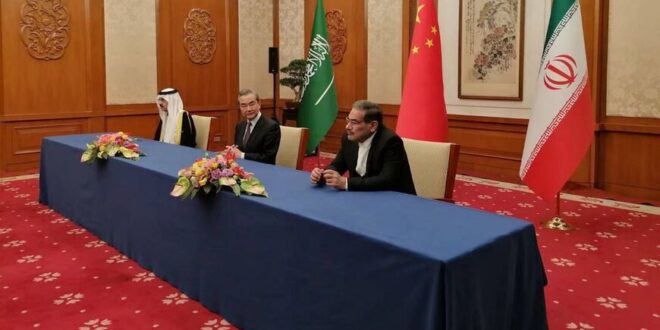The deal to resume diplomatic ties was brokered by China and follows Iranian President Ebrahim Raisi’s visit to Beijing.
Saudi Arabia and Iran have agreed to resume bilateral relations, in a rare breakthrough brokered by China. The two countries will also reopen their embassies after years of diplomatic freeze.
The agreement followed months of talks in China between delegations led by Saudi national security adviser Musaad Al-Aiban and his Iranian counterpart Ali Shamkhani. The intensified this week and were sponsored by Chinese President Xi Jinping, according to a joint statement from Saudi Arabia, Iran and China released by the Saudi Foreign Ministry.
Per the agreement, Iran and Saudi Arabia agreed to reopen their respective embassies within two months. The agreement also noted their “affirmation of the respect for the sovereignty of states and the non-interference in internal affairs of states.” They also agreed to enhance bilateral relations in multiple sectors.
The statement thanked China as well as Iraq and Oman for sponsoring past talks between Iran and Saudi Arabia. It was signed by Aiban, Shamkhani and Wang Yi of the Chinese Communist Party’s Political Bureau.
Why it matters: The reestablishment of relations between Iran and Saudi Arabia is a major turn for two geopolitical powers in the Middle East. For years, the two countries have had an adversarial relationship, marked with proxy wars and accusations of meddling.
The Yemeni civil war is perhaps the most notable outstanding issue between the two. Iran supports the Houthi rebels in Yemen that fight the Saudi coalition-backed government. The Houthis have attacked Saudi Arabia as a result. A cease-fire between the two sides expired last October, though the situation remains relatively calm.
Saudi Arabia, like other Gulf states and Israel, has also long voiced concern over Iran’s nuclear energy program as well as its missiles.
The reestablishment of relations is the result of years of talks as well as mediation by China and Iraq. Saudi Arabia cut off relations with Iran in 2016 after Iranian protesters attacked the Saudi Embassy in response to Saudi Arabia executing Shiite cleric Nimr al-Nimr. In 2021, Iraq facilitated talks between Saudi and Iranian officials. The dialogue continued last year, but eventually stalled.
There have been some notable developments leading up to Friday’s announcement. The Iranian and Saudi foreign ministers met in Jordan last December.
In February, Iranian President Ebrahim Raisi visited China to discuss trade with Chinese President Xi Jinping.
Know more: National Security Council spokesperson John Kirby said on Friday that the United States was informed of the deal. “The Saudis did keep us informed about these talks that they were having, just as we kept them informed on our diplomatic engagements, but we weren’t directly involved,” John Kirby told reporters.
The White House welcomed the agreement as potentially helping ease the war in Yemen. “We welcome any efforts to help end the war in Yemen and de-escalate tensions in the Middle East region,” a National Security Council spokesperson said.
“De-escalation and diplomacy together with deterrence are key pillars of the policy President [Joe] Biden outlined during his visit to the region last year,” the official added.
The official statement did not mention any specific concessions between Saudi Arabia and Iran. However, Cinzia Bianco, a research fellow at the European Council on Foreign Relations, said that the resumption of relations could lower regional tensions.
“The Saudis have long insisted that any restoration of diplomatic relations with Iran include an active and constructive Iranian contribution to end the war in Yemen,” Bianco told Al-Monitor. “If that and other regional tensions are lowered, that’s the real significance of the deal.”
Bianco added that Saudi Arabia decided to pursue a “conciliatory” approach to Iran due to the Islamic Republic being in a weakened position.
“The Saudis believe that Iran, under tremendous domestic and international pressure, with depleting resources that also diminished their regional role, they basically found themselves in a weaker spot,” she said.
In addition to US sanctions, Iran is facing pressure over its violent crackdown against the protests that began in the country last September. Kirby also mentioned the pressure in his remarks.
Saudi Foreign Minister Prince Faisal bin Farhan said that the agreement stems from the “kingdom’s vision based on a preference for political solutions and dialogue.”
يأتي استئناف العلاقات الدبلوماسية بين المملكة وإيران، انطلاقا من رؤية المملكة القائمة على تفضيل الحلول السياسية والحوار، وحرصها على تكريس ذلك في المنطقة. يجمع دول المنطقة مصير واحد، وقواسم مشتركة، تجعل من الضرورة أن نتشارك سويا لبناء أنموذجٍ للازدهار والاستقرار لتنعم به شعوبنا.
— فيصل بن فرحان (@FaisalbinFarhan) March 10, 2023The foreign ministries of Iraq, Oman and Jordan also released statements saying they welcomed the resumption of ties between Iran and Saudi Arabia.
Brian Katulis, vice president of policy at the Washington-based Middle East Institute, said it remains to be seen what effects the resumption of relations will have on the region. At the same time, the agreement has “symbolic importance” for China, according to him.
“It speaks volumes that if the US pulls back, others will step in and fill the vacuum,” Katulis told Al-Monitor. “Multiple voices in America have called for restraint or offshore balancing and that the US should downgrade its ties with the Middle East. When that happens, others like China and Russia seek to fill the gaps.”
The news of the Chinese breakthrough came only hours after the Wall Street Journal reported that Saudi Arabia is seeking US security guarantees and support for its nuclear energy program in exchange for establishing any relations with Israel. The Kingdom has reiterated publicly that a settlement to the Palestinian issue is a condition to such normalization.
 Eurasia Press & News
Eurasia Press & News



